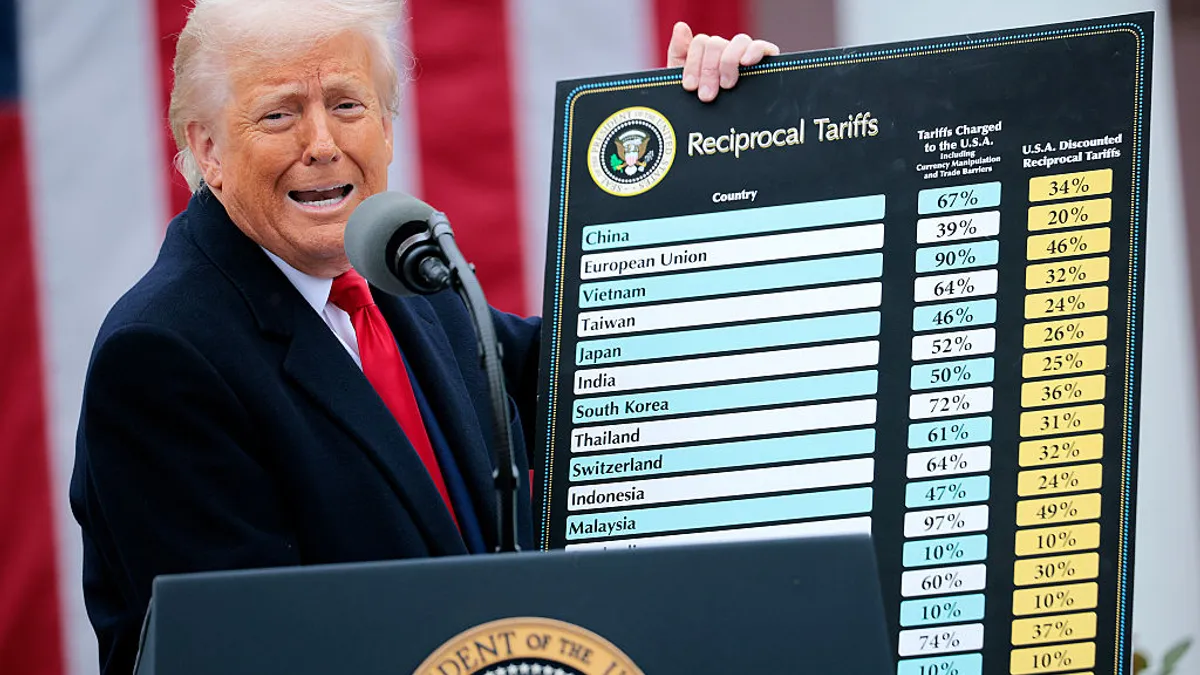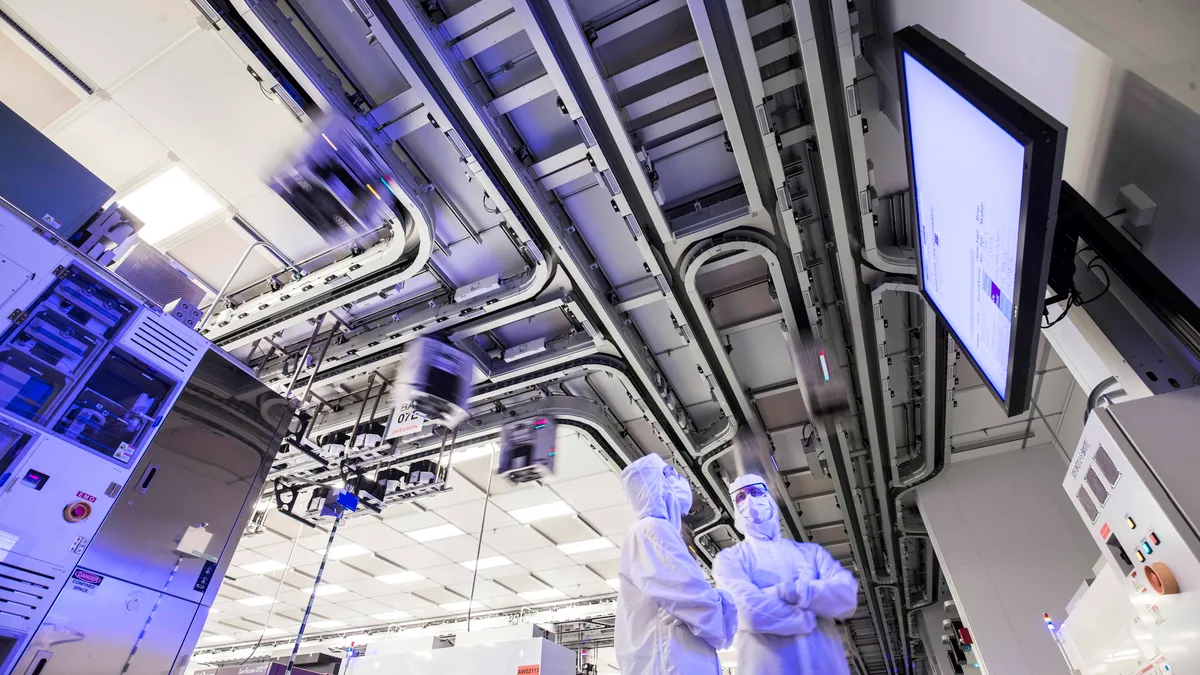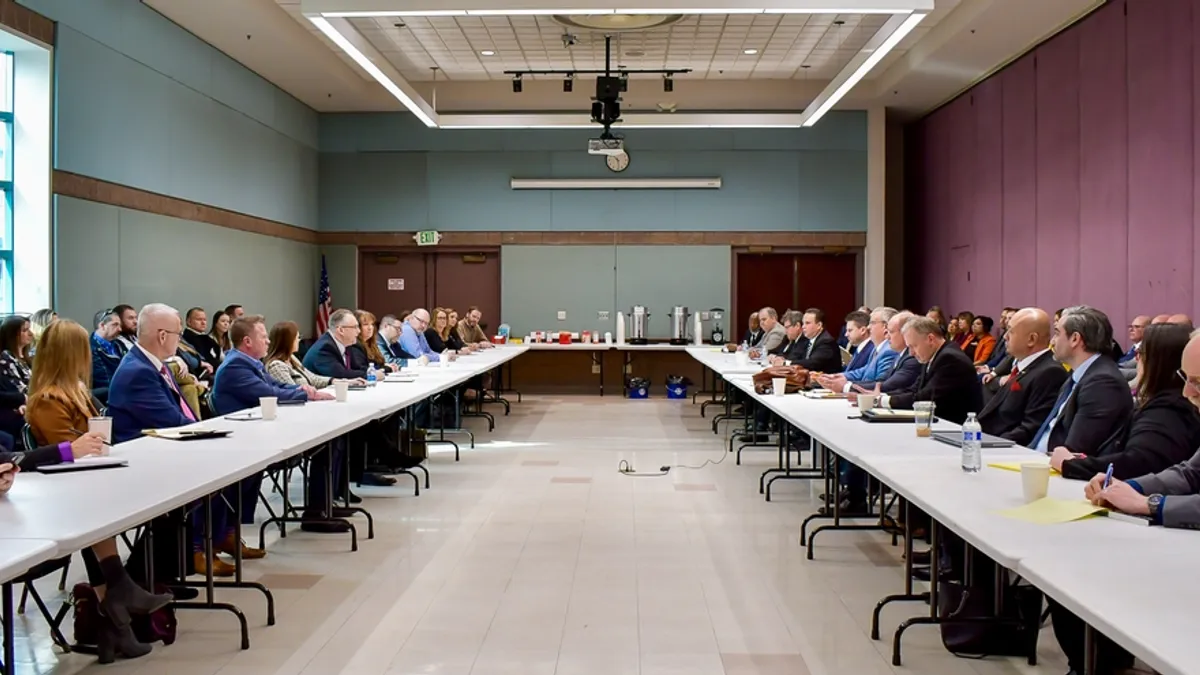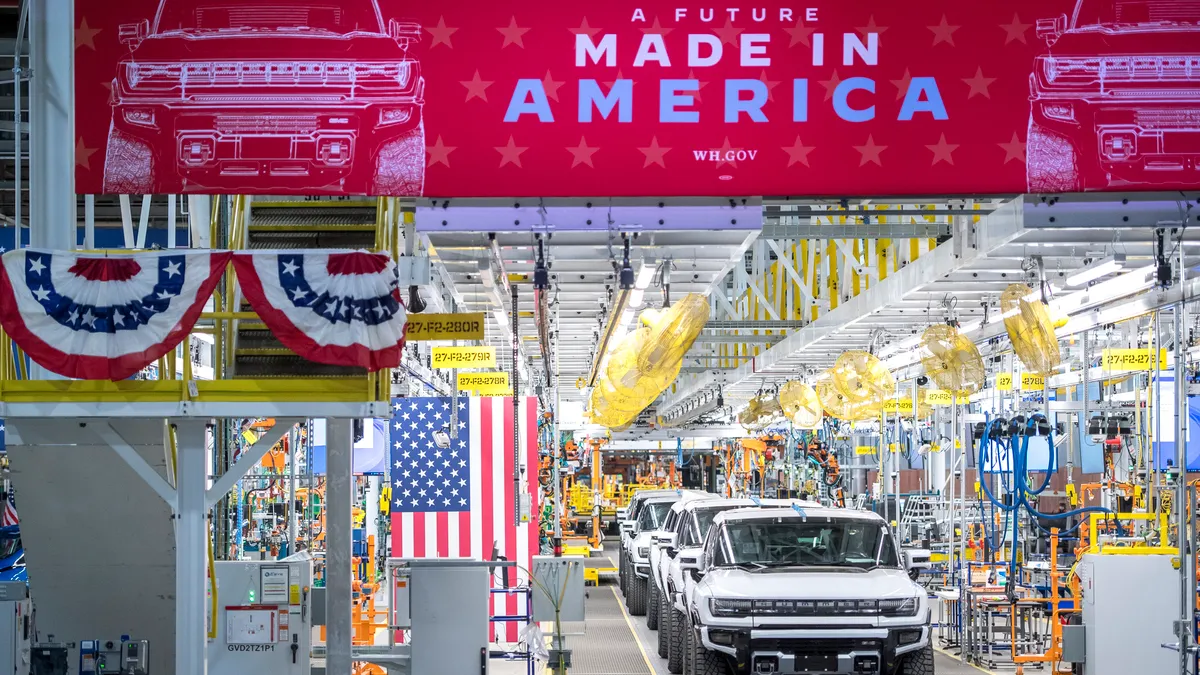Manufacturing industry groups are showing mixed support after President Donald Trump escalated his tariff strategy on Wednesday with plans to enact import levies of at least 10% across all countries on April 5.
The president also signed an executive order that sets “reciprocal” tariffs on countries who charge higher taxes on U.S. goods, including 34% against imports from China and 20% duties on goods from the EU. This has stoked vows of retaliation from European Commission President Ursula von der Leyen and other world leaders, creating further trade uncertainty.
While industry associations are largely aligned with the president’s efforts to increase domestic manufacturing activity, several are concerned with Trump’s approach as companies scramble to determine what the implications are on their own operations. Others, however, are supportive of the moves.
“In the face of unrelenting economic warfare, the United States can no longer continue with the policy of unilateral economic surrender,” Trump said during his “Liberation Day” speech on April 2.
In addition to the sweeping tariffs, Trump also enacted a 25% tariff on all foreign automobiles and auto parts, effective April 3 and May 3, respectively. While Canada and Mexico are exempt from the 10% baseline tariff, the countries are still subject to duties not covered by the U.S.-Mexico-Canada agreement.
As companies nearshore operations to the U.S. to avoid extra taxes on their products, spurring billions of dollars in investments and job growth, trade groups are bracing for higher costs and other disruptions related to Trump’s latest announcements.
Here is what industry leaders are saying about the Trump administration’s latest tariff moves.
National Association of Manufacturers President and CEO Jay Timmons
“Needless to say, today’s announcement was complicated, and manufacturers are scrambling to determine the exact implications for their operations. The stakes for manufacturers could not be higher. Many manufacturers in the United States already operate with thin margins. The high costs of new tariffs threaten investment, jobs, supply chains and, in turn, America’s ability to outcompete other nations and lead as the preeminent manufacturing superpower.
“Manufacturers build things in America to sell around the world — and manufacturers in America share President Trump’s goal of supporting manufacturing investment, growth and expansion here at home. The president has the opportunity to achieve this vital goal while also minimizing disruptions and cost increases across our industry.”
U.S. Chamber of Commerce Chief Policy Officer Neil Bradley
“What we have heard from business of all sizes, across all industries, from around the country is that these broad tariffs are a tax increase that will raise prices for American consumers and hurt the economy. We urge policymakers to instead focus efforts on accelerating the pro-growth agenda of extending our current tax policy, re-balancing regulations, and unleashing the full potential of American energy — all policies that will grow the economy and create more opportunities for Americans. In addition, the U.S. should begin negotiating new trade agreements to open up more markets for businesses and workers which will support more American jobs and lower prices.”
American Chemistry Council
“Trade plays a critical role in the U.S. chemical industry’s competitiveness. As the second largest export manufacturing sector, the U.S. chemical industry posted a trade surplus of more than $28 billion in 2024, with exports supporting nearly 200,000 domestic jobs.
“ACC will be reviewing these announcements in greater detail to determine how they affect the U.S. chemical industry. ACC wants to work constructively with the Administration on a pro-growth trade agenda that decreases America’s supply chain vulnerabilities while negotiating new measures that benefit domestic production and jobs.”
Consumer Brands Association VP of Supply Chain Resiliency Tom Madrecki
“As the largest domestic manufacturing sector by employment, supporting more than 22 million American jobs and contributing $2.5 trillion to the U.S. GDP, the consumer packaged goods industry already manufactures the majority of its products here in the United States. However, there are critical ingredients and inputs that need to be imported due to scarce availability domestically. No amount of tariffs will bring these inputs back to the U.S. However well intended, the success of the President's America First Trade Policy, must recognize the U.S. companies that are already doing it the right way but depend on imports for specific ingredients and inputs that cannot be sourced domestically.”
Steel Manufacturers Association President Philip Bell
“President Trump is a champion of the domestic steel industry, and his America First Trade Policy is designed to fight the unfair trade that has harmed American workers and weakened manufacturing in the United States. The recently reinvigorated 232 steel tariffs have already started creating American jobs and bolstering the domestic steel industry.”
American Iron and Steel Institute President and CEO Kevin Dempsey
“American steel producers are all too familiar with the detrimental effects of unfair foreign trade practices on domestic industries and their workers.
“Driven by subsidies and other foreign government trade-distorting practices, global overcapacity in the steel industry reached 573 million metric tons in 2024 and has spurred high levels of exports of steel from countries like China, Japan, Korea, Vietnam and Indonesia that continue to produce steel in volumes that significantly exceed their domestic demand. These exports directly and indirectly injure steel producers in the U.S. and government action to address this unloading of steel overproduction on world markets is overdue.”
Plastics Industry Association President and CEO Matt Seaholm
“In the spirit of supporting policies that encourage American manufacturing, our industry urges a thoughtful, strategic approach to trade and tariffs. The plastics industry is a cornerstone of U.S. manufacturing and a critical contributor to our economy. In 2023, the U.S. plastics industry exported $74.2 billion in goods — more than it imported — resulting in a trade surplus of nearly $1 billion.
“These new tariffs will disrupt supply chains, increase production costs, and undermine our global competitiveness. Rather than imposing across-the-board tariffs that will harm American manufacturers and stifle growth, we encourage the administration to consider more targeted policies that take into account supply chains, promote investment, and maintain growth in U.S. manufacturing.”
Alliance for American Manufacturing President Scott Paul
"The United States maintains one of the world's most open markets, but the trade practices of countries like China — and even some of our allies — have damaged communities throughout the country, shutting down factories and eliminating family-supporting jobs. While I know some policymakers are eager to derive significant revenue from the tariffs, I'd prefer to see more manufacturing jobs and domestic supply chains established, and I hope that is the priority here.”
Association of Equipment Manufacturers SVP of Government and Industry Relations Kip Eideberg
“Equipment manufacturers appreciate the Trump administration’s commitment to reviving American manufacturing and building an economy that puts American workers first. While we agree that the key to a strong U.S. economy is building more products in America, we need certainty in the trade environment to make investments in domestic manufacturing. We are concerned that reciprocal tariffs on our trading partners will hurt our industry and our customers. Tariffs are just one tool at the administration’s disposal.”
Aerospace Industries Association VP of International Affairs Dak Hardwick
“The Aerospace Industries Association has been tracking the administration’s tariff actions closely and will be assessing the near- and long-term impacts on the American aerospace and defense industry. We continue to champion our industry’s role as the nation’s top exporting manufacturing industry as the Administration advances its America First trade policy.”
Society of Chemical Manufacturers & Affiliates
“As this new tariff framework takes effect, specialty chemical manufacturers face deep uncertainty. Many SOCMA members are now confronting significantly higher costs for the raw materials they rely on — inputs often unavailable at scale within the U.S. These sudden shifts are occurring in the context of complex, global supply chains and long-standing customer commitments. The stakes are high, and so is the pressure to adapt quickly.
“We urge the administration to take a strategic, sector-informed approach — one that ensures affordable input access, promotes resilient supply chains, and leverages the unique value of the specialty chemical sector.”
Solar Energy Industries Association SEIA President and CEO Abigail Ross Hopper
“American solar manufacturing has grown six-fold in the last several years, and we are quickly taking back control of the supply chain from China to build the strongest solar manufacturing base in the world. Sudden changes in policy can be incredibly disruptive, chilling investments and slowing job creation — especially for manufacturers. In the global competition for capital, manufacturers need long-term policy certainty to be confident about making multi-billion-dollar investments.”
National Electrical Manufacturers Association President and CEO Debra Phillips
"The North American electrical system powers economies and provides products and services that are essential in developing national infrastructure and increasing competitiveness. The industry is committed to continue its historic investments in U.S. manufacturing. We urge the Trump Administration to prioritize business certainty, U.S. competitiveness, realistic transition periods for moving key supply chains, and minimizing the impact on critical manufacturing sectors. Trade policies must also ensure our nation’s manufacturers can continue producing critically needed electrical goods for a secure and reliable grid.”
Sara Samora contributed to this story.




















